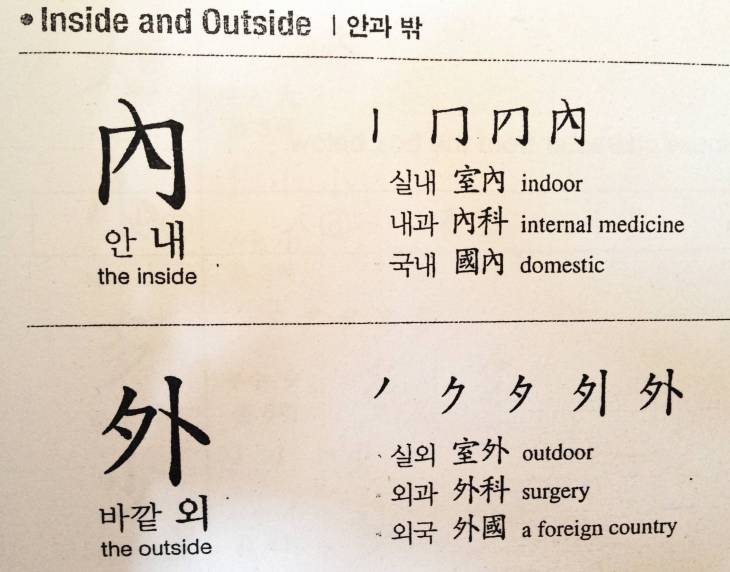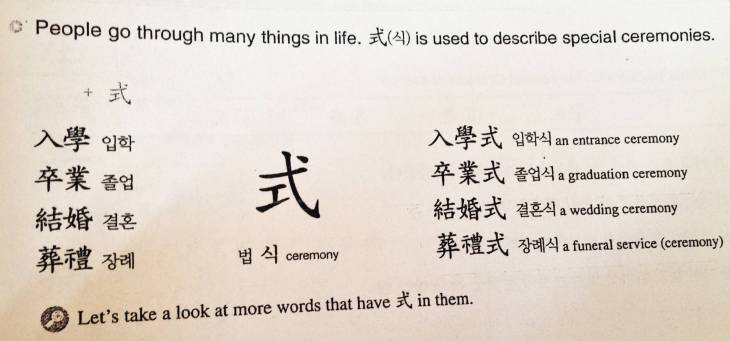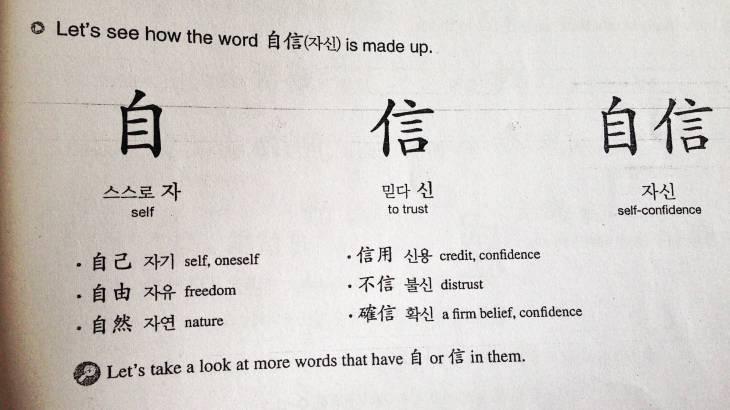There are many discussions about whether Korean learners study Hanja or not. In my opinion, Korean learners are encouraged to study Hanja to help them learn Korean better. Hanja (한자, 漢字) is the Korean name for the Chinese characters that are borrowed from Chinese and incorporated into the Korean language with Korean pronunciation.( http://en.wikipedia.org/wiki/Hanja).
Chinese influenced the development of many Asian languages including Korean, Japanese or even Vietnamese. Before Hangul was created by King Sejong (1443), Chinese characters were very common and popular in Korea. My Korean teacher said that because Hanja was too difficult to learn, King Sejong decided to create an easier alphabet system which was Hangul so that everybody could easily learn. Therefore, many people argued that why they had to learn Hanja nowadays.
I agreed that Hanja was more difficult to learn than Hangul. However, according to the Standard Korean Dictionary (표준국어대사전) published by the National Institute of the Korean Language, Hanja constitutes approximately 69.1% of the Korean vocabulary. Therefore, Korean learners can benefit from Hanja root words in the same way English learners benefit from Greek or Latin root words.
For example, if we know that the Latin root word “spec-” means “ looking”, we can easily guess the meaning of the following words:
Spectator: a person who is watching an event, especially a sports event
Spectacle : a sight or view that is very impressive to look at
Inspect: to look closely at something/somebody
Introspection: the act of looking into one’s own thoughts and feelings
Circumspect : careful to look at all possibilities before acting; cautious
Retrospective: looking back at past things
Perspective: one way of looking at things
Speculate: to look at and think about something from different points of view
(http://quizlet.com/7805958/greek-latin-root-words-spec-see-look-flash-cards/)
Likewise, if we know the hanja word 發 (발) means “discovering, uncovering”, we can guess these following words and remember them better.
發見 발견 discovery
發明 발명 invention
發展 발전 development
I will give you another example. If we combine the hanja word 敎(교) meaning teaching and 育(육) meaning raising, we can guess that 敎育 (교육) means education and also guess other words that have the same roots.
敎師 교사 teacher
敎室 교실 classroom
敎科書 교과사 textbook
育兒 육아 upbringing of a child
體育 체육 physical education
As you can see, if you learn Hanja, you can benefit many things such as:
1. Being able to guess Korean words easier.
2. Remember Korean vocabularies easier by linking the Hanja root words
3. Expanding Korean vocabularies by combining different Hanja words
4. Lessen the time of learning Korean
I recommend these books for Korean learners to study Hanja if you are interested:
1.Useful chinese characters for learners of korean
This book provides beginner and intermediate lessons that can help you learn the most frequently used Hanja. The structure and the explanation are very easy to understand and follow. There are a lot of exercises that can help you to review the Hanja.
2. Elementary Hanja writing note
This series can help you learn basic Hanja words effectively. You can see a review here
http://pinayjubuinkorea.wordpress.com/2014/04/01/book-review-%EC%B4%88%EB%93%B1%ED%95%9C%EC%9E%90%EC%93%B0%EA%B8%B0%EB%85%B8%ED%8A%B8-level-3-elementary-hanja-writing-note-level-3







Yes you should learn it! I’ve learned something new just by looking at your pictures from inside the book. I’m definitely buying this book within the next couple of weeks!
–Charm
LikeLike
Hello Charm,
Thank you very much for your comment. I’m glad that you find my post useful. I hope that you will find more interesting things in that book. ^^
LikeLike
This book is so important. I’ve been referring to it for such a long time and you can start to infer meaning from the Chinese root words. An invaluable reference book for Korean language learners. I’d highly recommend it. Plus you will see a lot of Chinese characters at restaurants, in newspapers or at other places.
LikeLike
Hello Martin Sketchley,
Thank you very much for the comment. This book is really a useful source for learning Hanja and expanding Korean vocabularies. I have learned a lot from this book. I am happy that you feel the same way about this book. ^^
Oh, I agree with you. Although Hangul is more popular now, Chinese characters still play an important role in Korean daily life. I heard that Korean kids even learn how to write Hanja at the early age.
LikeLike
I’m currently using this book, and I really like it. It definitely helps me learn new words since I’ve started to recognise hanja-roots when hearing a new word.
LikeLike
Reblogged this on Korean Vitamin and commented:
Should you? I don’t know. I know hanja from Japanese kanji so it’s not a problem for me. I wonder how you can remember hanja if you can rarely find them in sentences. And I often read Japanese people said Korean people themselves are weak at reading hanja. Read sweetangel’s take on this. ###
LikeLike
Will consider buying this. I’ll save for this book. Thanks for a great review.^^
LikeLike
Hello Hana,
Thank you very much for your comment. I hope that you will find this book useful. ^^
LikeLike
where can i buy this book ? Can i have a copy one ?
LikeLike
You can buy this book on this link. They ship book wordwide
http://www.twochois.com/useful-chinese-characters-for-learners-of-korean/
LikeLike
thanks a lot 😀
LikeLike
Before l earning Korean I’d learned about 100 Japanese Kanji so it helps that there is a common thread between words and groups of words across the two languages (three if you count the original Chinese of course).
I think Hanja helps because it means I can have a stab at what new Korean words might mean, and it gives my mind more to hold on to if I am visualising a particularly vivid Hanja symbol.
I’ve just bought the book anyway, so let’s hope it’s useful!
LikeLike
Hello underworld9202,
Thank you very much for you comment. I have learned Mandarin Chinese for 5 years, but what I learn is simplified Chinese while the Hanja uses the traditional chinese characters.
I have heard that Kanji uses the traditional chinese characters too. You know Japanese, so it will become easier for you to learn Hanja
LikeLike
Oh I didn’t realise the characters are different in Mandarin and Simplified Chinese. Sorry!
I’ve started using the book and it’s pretty good. I think it will help ‘join up’ my thinking very well.
LikeLike
For more info about hanja, visit http://everydayhanja.blogspot.com
LikeLike
Thank you for your recommendation ^^
LikeLike
i personally feel that if Korean people only use Hanjas, it would be much easier for learners that speak chinese since we are so good at remembering a character’s pronunciation~
LikeLike
I really admire people who can remember Chinese characters. They are too difficult to remember. Could you give me some tips to remember them?
LikeLike
Hey I built a website to study Korean vocabulary through hanja! It’s called Hanja Explorer, and you can find it here: http://www.hanja.me
LikeLike
Dear Pablo, thanks you for introducing the website. It is very useful for the learners.
LikeLike